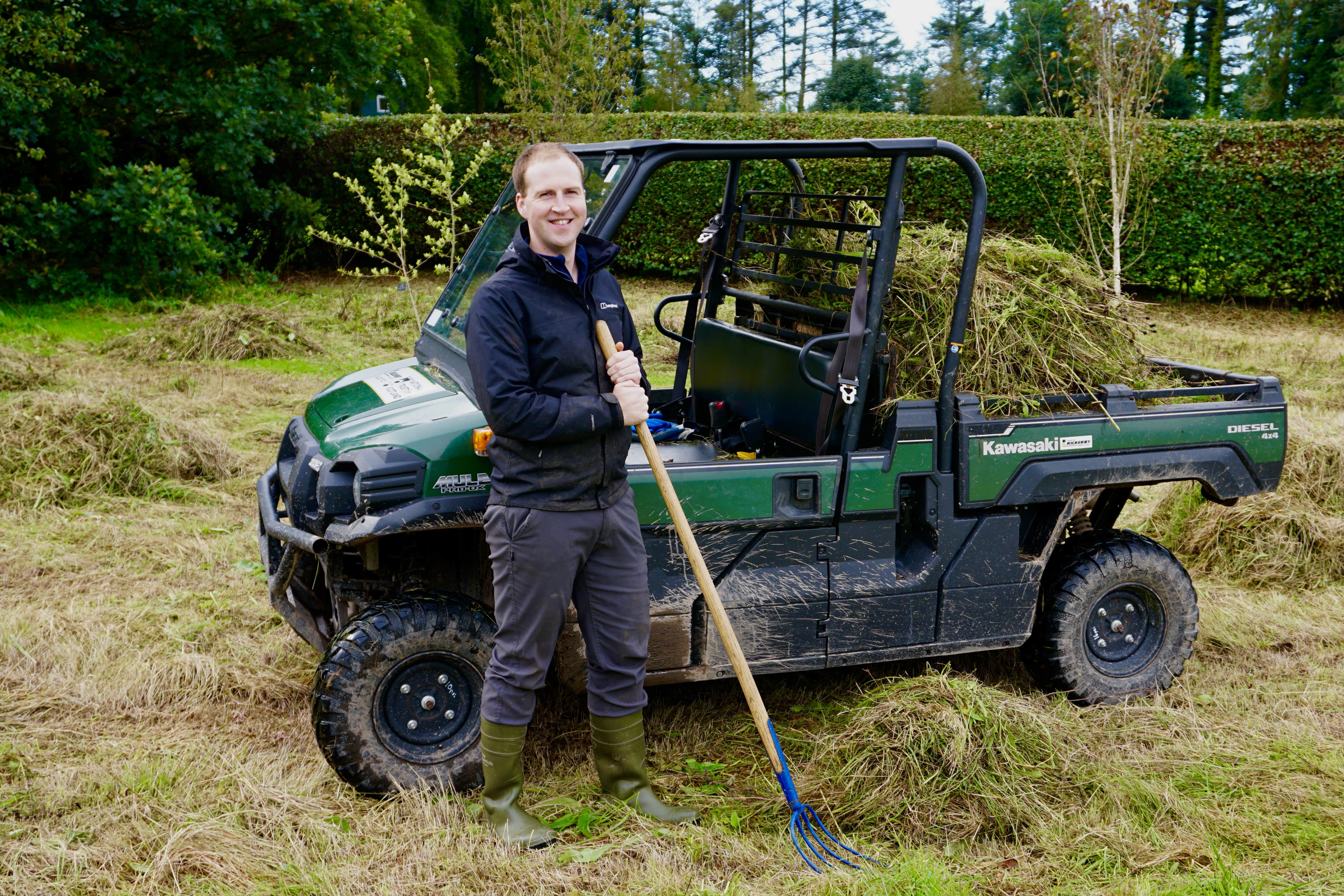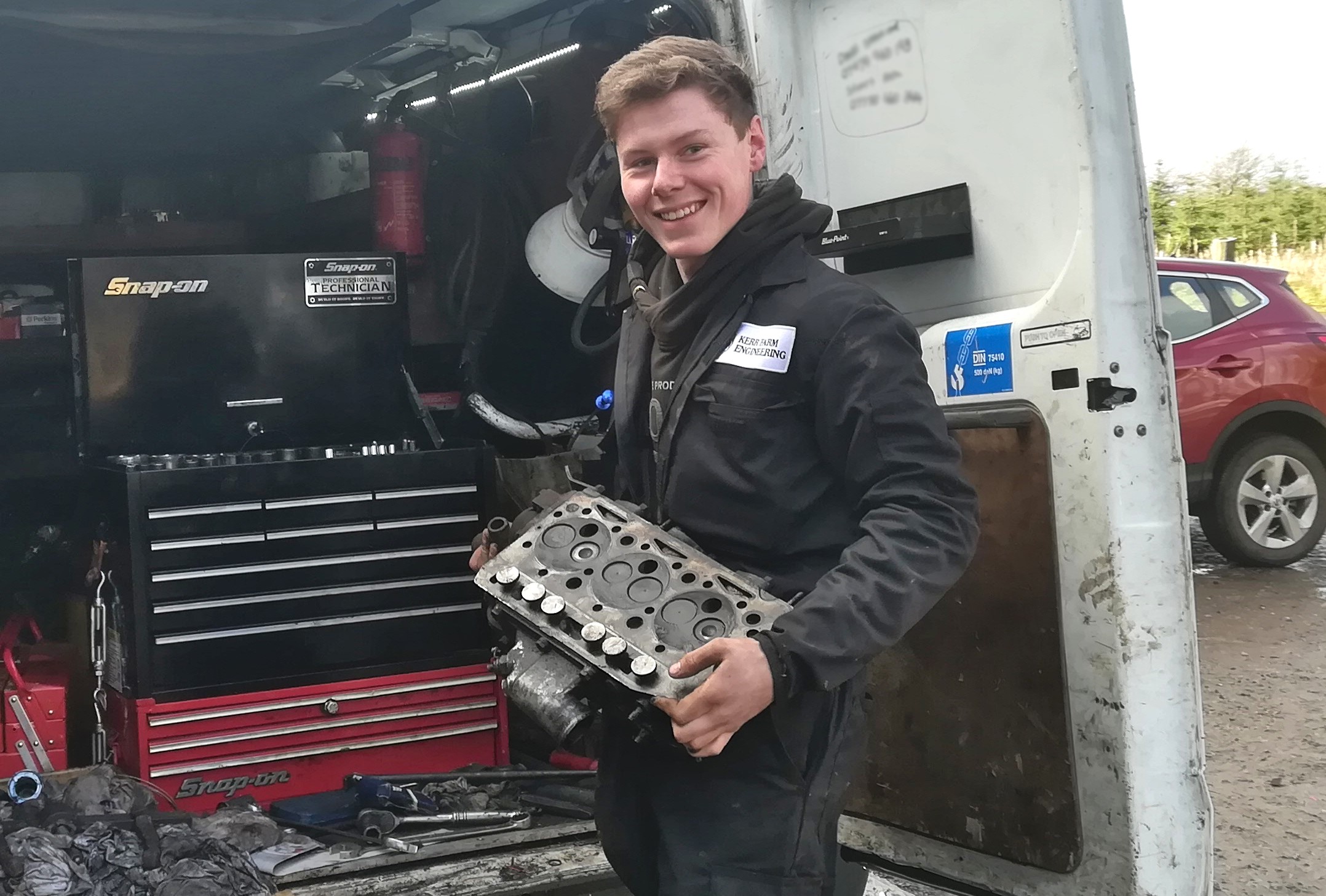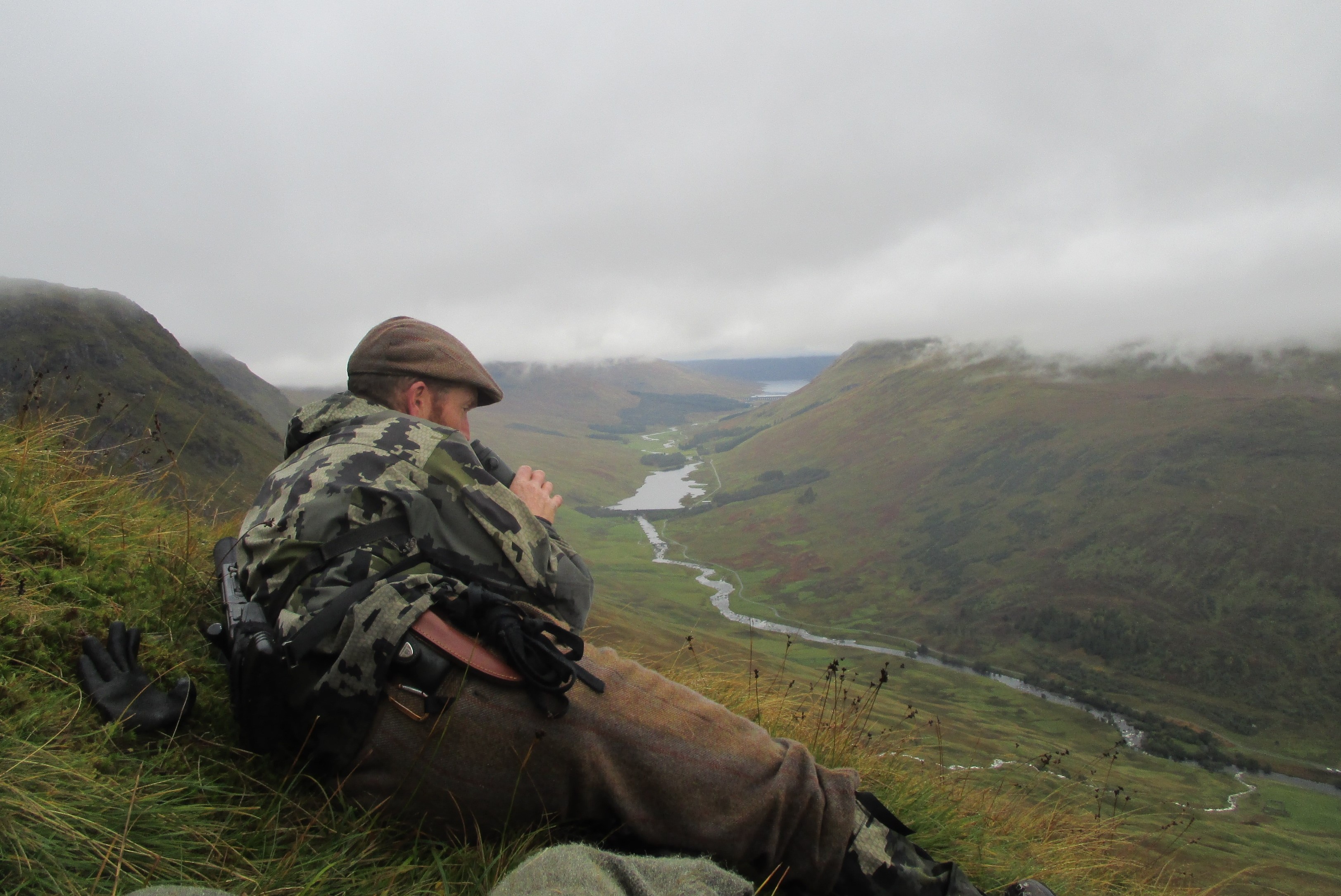

29-year-old Tim Buchan from Forfar in Angus has always had a love of the outdoors, but his initial career took him in a different direction. He studied international hospitality management then did a master’s degree in digital marketing, before going on to work in retail and hospitality for several years.
As someone who was brought up in the country with strong family connections in agriculture, Tim felt he was in the wrong place, but opportunity soon came knocking. It started when he found out about a trainee post being available with Trees for Life, part of Scotland’s Skills for Rewilding Project. Supported by the Heritage Lottery Fund, this initiative aims to develop rural skills within the community and re-establish wild areas and natural habitats across Scotland.
Tim said: “When I saw the advert, I knew this was what I was looking for. Trees for Life were offering a role as a nursery trainee at their flagship rewilding estate at Dundreggan near Fort Augustus, and after a 12-month course I would graduate with an SVQ 2 in horticulture. I applied immediately and was delighted to get accepted.”
While working at Trees for Life, Tim built up his skills in commercial horticulture, tree propagation and planting. Trees for Life is working to rewild the Scottish Highlands and restore the Caledonian Forest. Although it once covered a large area of the Highlands with Scots pine, birch, rowan, juniper and aspen trees, it is now just 2% of its former size. Through planting native tree species, removing non-native species and fencing seedlings, Trees for Life aims to help the natural regeneration of the forest. Tim became involved in all aspects of propagation at the nursery, from seed collecting, preparation, storage, germination and growing through to planting in the wild.
Tim said: “I felt what we were doing was really significant – we were helping to grow and develop the species that are needed in our wild areas. It was very satisfying and my time at Trees for Life really helped spark my passion for plant propagation and husbandry.”
As his training with Trees for Life came to an end and Tim was searching for a new position, he was delighted to see an advert for The National Trust for Scotland’s School of Heritage Gardening at Threave Garden, Dumfries & Galloway.
Although Threave specialises in ornamental gardening, which is a world away from the commercial work Tim had been doing, his passion for gardening meant this was a perfect opportunity and he applied to join the 12-month course.
Tim said: “I was really happy when I got onto the Threave course. They have a great set up with glass houses, a walled garden and grounds, so you can pick up a broad range of horticulture skills over a short period of time. I ended up with a level 2 and 3 qualification from the Royal Horticultural Society, which covers plant propagation across three climate zones in the glass houses, working in the walled garden on fruit and vegetable production and in the greater grounds where there’s lots of pruning, planting out and establishing new beds. There was some theory about things like plant identification, but much of it was out doing the work, keeping diaries, writing up reports and working in the various areas of the Threave estate. It has been a great experience and really set me up for life.”
While doing his studies at Threave, the Covid-19 pandemic hit, which presented many challenges to him and his fellow students. Tim explains:
“When the lockdown started back in March 2020, we had to cut our team by half, so we were looking after the garden with a skeleton team. Luckily, all the students were living together on site, so technically we were in a bubble and didn’t need to socially distance. Lockdown was a time to keep the garden ticking over rather than starting any significant projects that demand manpower. It was a tough time for Threave financially because they could no longer promote the garden at local shows.
Our training was also impacted because some of the instructors had to self-isolate, but in some ways we learnt more because we had to get on with things ourselves. We were given more responsibility sooner and this gave us confidence and self-belief. So, despite the challenges, it wasn’t all bad.”
With a couple of years now under his belt, Tim has some sound advice for budding horticulturalists.
He said: “I think the crucial thing is a willingness to learn and having a genuine enthusiasm in what you do. A love of working outdoors is important and you shouldn’t be afraid to take the first step. Doing something new or different is always tough, but once you start, its much easier. Finally, I’d say having some volunteering experience before you apply is really helpful. It shows your interest and willingness to gain unpaid experience.”
Tim doesn’t have any firm plans for the future yet, except to continue to build upon his growing experience.
He said: “I have so much to learn and I’m really happy with my role at Threave, which is a great place to learn your trade. I will hopefully go on and get some tickets in chainsaw operation, tractor driving, spraying, health and safety and other areas, as well as build my experience in all areas of plant propagation, which is my passion. As far as the future is concerned, I have a real admiration for the work that The National Trust for Scotland do. They have a big impact on the management of many of our public gardens and outdoor spaces and offer many specialist course in plant management, so maybe that’s something to consider. For now, I’m happy to keep working away and growing my interest and skills in all areas of horticulture.”
Since the age of 16, Robbie Gray from Lanark has been working for the Hamilton Ross Group while doing a Modern Apprenticeship through Scotland’s Rural College. Now 19, Robbie has progressed to working on mechanical and technical repairs for customers, as well complex software packages that fine tune the performance of tractors and other machinery. He also works part-time with a plant mechanic and drives tractors for an agricultural contractor to build his skills.
Robbie said: “I’m really enjoying the apprenticeship. It’s a great way of working, earning and learning. You get everything all in the one place - you are out making a wage to fund your life, and at the same time you are working towards a qualification and gaining skills.
I really enjoy the variation of different subjects at college. You get a good grounding on the topic you’re studying, from practical classes rebuilding engines, to understanding how everything works through class work. If all goes well, I should finish my apprenticeship next year, which will be a great start to my career.”
Robbie has always had a keen interest in agriculture, working alongside his dad in the family business and picking up invaluable practical skills which demonstrate the importance of work experience as part of the learning process. Through the apprenticeship, Robbie has been able to expand on what he learnt at home, building a firm foundation for the future.
As with many jobs in the farming sector, no two days are the same, and Robbie is relishing the challenge. He said: “I can do all sorts in a year, from fixing sileage equipment in the summer, to working on salt spreaders and slurry tankers in the winter.
Each day is different and that’s why I love my job. One day I could be servicing a telehandler out on the farm, the next I might be dealing with a breakdown at the side of the road. Some days I’ll be head down in the workshop getting a new machine ready for a customer – every day is different and every day is a challenge. It’s perfect for me.”
Robbie is quick to understand the crucial role that he and other land-based engineers play in keeping farms up and running. He said: “Keeping machinery in top condition is vital. When things breaks down, animals might not get fed and this has an impact on the food chain. Everything has a knock-on effect.”
Today, farming has become a highly skilled job, with new technologies improving the efficiency of food production. From GPS guided tractors that improve the precision of cultivation, to ‘smart’ farming techs that automate processes, the industry has undergone a technological revolution in recent years.
Robbie said: “Tech plays an important role in our job. In the workshop we all have our own laptops, which we use to update a tractor’s internal software, such as changing settings to improve efficiency, or dealing with any technical issues a tractor may have. Gone are the days when farming was just a mechanical job – it’s more complex but I think that adds to the challenge and gives you new skills to learn.”
Robbie has learnt first-hand the challenges and joys of farming life and is keen to share his experiences with others. Having won the Land-Based Learner of the Year Award at Lantra Scotland’s ALBAS in March, he gets to travel the country as one of Lantra’s ‘Industry Champions,’ promoting the rural sector and speaking to young people about farming and engineering.
Robbie said: “It’s great to win a Lantra award - it’s a big achievement and shows that if you put the work in you get rewarded. That makes me proud. I’ve also had the chance to speak to other people about my career and I always say that if you have a keen interest in the job and enjoy practical work in an outdoors setting, you’ll do well.
Some people get put off having to work in all weathers, but I think that’s what makes the job so special. Some days are wet and windy, but you’ve always got the beautiful Scottish scenery to look at. If its frosty you just need to wrap up and get on with the job in hand, and then in the summer, you can enjoy taking in the sunshine while you’re fixing a tractor on a picturesque hillside. There’s not many jobs that give you those kinds of experiences!”
So what does the future hold for Robbie? He said: “I’m looking forward to completing my apprenticeship next year and furthering my career with Hamilton Ross Group. It’s a great company with great people, so I am enjoying working and building my skills here. One day I might want to run the family business, who knows. For now, it’s about getting my head down and taking it one day at a time.”


William completed a Modern Apprenticeship with Kerr Farm Engineering in Ayrshire and now works for the business as a land-based engineer.
“Growing up on a farm and being fascinated by the ways in which mechanics managed to fix things gave me a driving passion to get into agricultural engineering.
One of the most rewarding things about my work now is being able to arrive at a job in my own van, suitably prepared and equipped to carry out a successful repair and then producing a happy customer.
A highlight was completing my first clutch job on a tractor, as I had to really push my technical skills to the limit.
There are lots of paths open to you in this industry, so I’d encourage people to try as many things as possible. The possibilities are endless and extremely rewarding professionally and personally.”
After a career in the Royal Marines, Andy decided to fulfil his dream of being a deerstalker and did an HNC in Game and Wildlife Management with North Highland College UHI.
“I thought it would be difficult to find a new role that could provide me with the same level of challenges and sense of achievement as 25 years in the Royal Marines, but becoming a deerstalker was the perfect move.
It’s a really rewarding career, as you’re privileged to be managing one of the country’s most iconic mammals, while working in such a picturesque environment.
There aren’t many jobs in which you share your office with Golden Eagles and Ptarmigan, while enjoying a view of Ben Nevis.
Whether it’s being there for someone’s first experience of deer stalking or interacting with people from all walks of life on wildlife tours, there are highlights every day.
My new role has exceeded all that I wanted my new career to be.”
